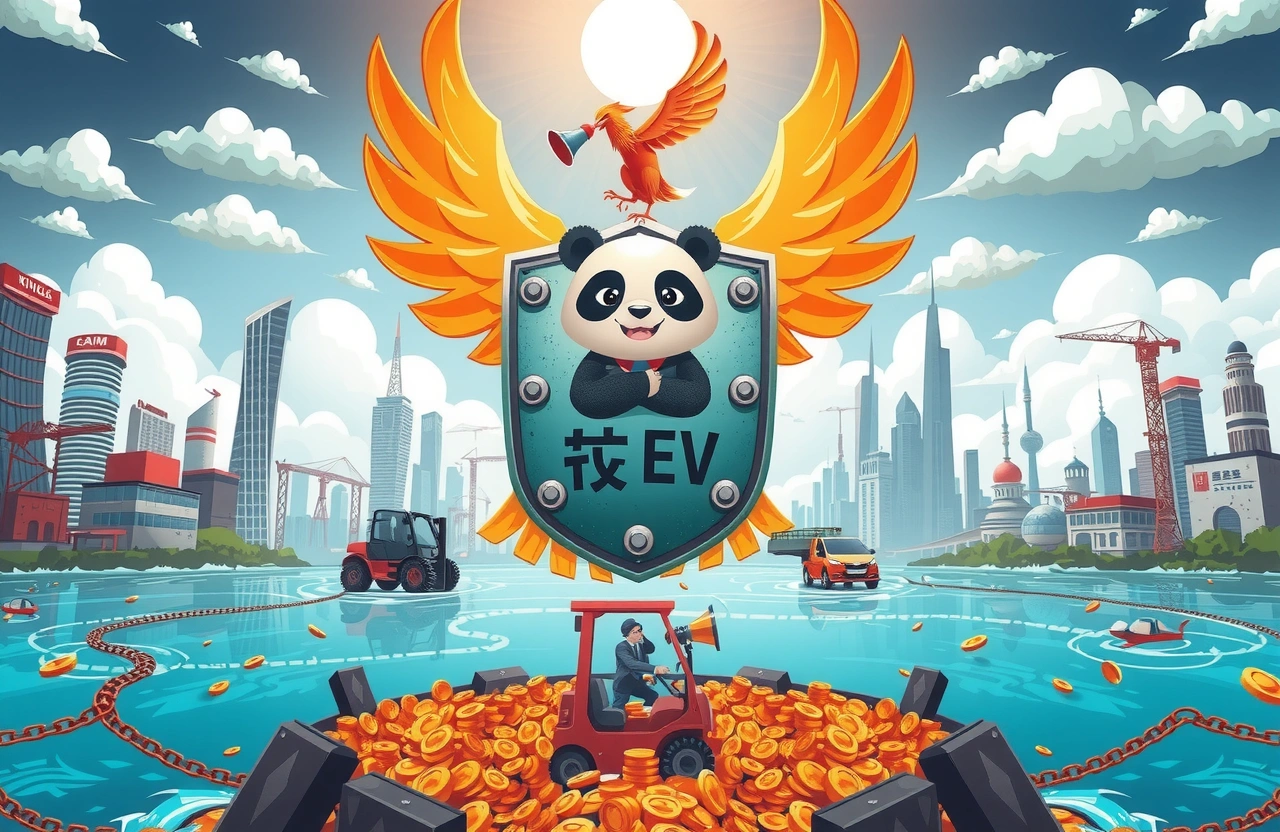• Industry consensus grows: Chinese automakers forge united front against involutionary practices hurting profitability and sustainability\n• Concrete measures deployed: Over 17 manufacturers pledge 60-day supplier payment cycles; major brands accelerate dealer rebate processing\n• Regulatory clampdown intensifies: Banking authorities ban ‘high-rate, high-rebate’ loan schemes distorting consumer finance markets\n• Economic imperative exposed: Q1 2025 profit margins plunge to 3.9% amid intensified price wars, forcing systemic reforms\n\nChina’s automotive sector has reached a critical inflection point in its battle against self-destructive competition. What began as fragmented pleas for industry rationality has evolved into coordinated action across the entire ecosystem—from raw material suppliers to dealership networks—as leaders confront the tangible costs of cutthroat practices. At the heart of this transformation lies the industry’s determined anti-involution stance, manifesting through binding payment commitments, rebate overhauls, and regulatory interventions targeting financial excesses. These structural shifts signal a profound realignment in how automakers balance competitive drive with collective survival.\n\n
The Anti-Involution Imperative Gains Momentum
\nChina’s automotive landscape witnessed unprecedented coordination when 17 major manufacturers simultaneously pledged to slash supplier payment periods during June 2025. This extraordinary alignment followed the China Association of Automobile Manufacturers’ (CAAM) emergency May 31st bulletin denouncing ‘bottomless price wars.’ The move received explicit endorsement from the Ministry of Industry and Information Technology, which promised ‘resolute measures against excessive competition’ and strengthened corporate compliance oversight.\n\n
Executive Consensus Emerges
\nKey industry figures publicly championed the anti-involution movement. Xiao Peng Chairman He Xiaopeng (何小鹏) declared post-coordination meetings: ‘The winds are changing toward rationality—tech-driven carmakers must demonstrate social responsibility.’ Similarly, Xiaomi CEO Lei Jun (雷军) emphasized: ‘We categorically reject predatory pricing while strictly implementing regulator guidelines on 60-day payments.’ This shared leadership stance marks a departure from isolated corporate positioning toward collective survival strategy.\n\n
Institutional Enforcement Ramps
\nRegulatory teeth behind anti-involution principles emerged through\n- Enhanced CAAM-NDRC coordination for sector-wide compliance audits\n- Mandated sales incentive disclosures to eliminate hidden discount schemes\n- Cross-provincial task forces monitoring localized promotion anomalies\nAs CAAM Deputy Secretary Xu Haidong explains: ‘Price turbulence destabilizes R&D investment cycles—standardization prevents that bleed.’\n\n
Transformative Supply Chain Reengineering
\nAutomakers’ June commitments evolved beyond rhetoric into contractual transformation. The 60-day payment guarantee—covering tier-1 through tier-3 suppliers—immediately unlocked working capital trapped in legacy 120-180 day cycles. Seven major OEMs publicized advance payment programs for small-to-medium enterprises, while SAIC pledged complete elimination of supplier-financed commercial acceptance bills.\n\n
Dealer Network Stabilization
\nManufacturer-dealer dynamics underwent parallel restructuring. Within days of supplier commitments, Guangzhou Automobile Group accelerated dealer rebate processing to under 60 days—a move mirrored by BMW Brilliance, BAIC BluePark, and others. The downstream impact proved immediate:\n\n- Average dealer capital turnover accelerated by 18% through July\n- Floorplan financing rejection rates dropped 9.2% among regional lenders\n- Dealer inventory holding costs decreased 6.8% year-over-year\n\n’These aren’t concessions—they’re recognition that dealership viability underpins brand health,’ notes China Auto Dealers Association researcher Yan Jinghui.\n\n
Curbing Financial Market Distortions
\nPerhaps the most aggressive anti-involution action targeted lender-manufacturer collusion through ‘high-interest, high-rebate’ (高息高返) programs. By mid-June, banking regulators in Guangdong, Jiangsu, and Zhejiang provinces banned:\n- Interest subsidies exceeding PBOC benchmark rates\n- Performance-based rebates linked to loan penetration targets\n- Manufacturer-funded default protection pools\nOne regulator’s leaked memo clarifies: ‘These schemes transfer manufacturer losses to banking systems—they constitute regulatory arbitrage.’\n\n
Consumer Protection Dimensions
\nThe interventions carried significant consumer welfare implications:\n\n- Borrower complaints about hidden financing fees dropped 34% month-over-month\n- Auto loan early-termination penalties standardized across major lenders\n- Mandatory cooling-off periods instituted for all dealer-arranged financing\nEssentially, curtailing lender-manufacturer rebate deals subsidized cleaner retail experiences.\n\n
Crucial Economic Drivers: Why Anti-Involution Matters
\nCurrent financials reveal the destructive impact of pre-regulation competition. National Bureau of Statistics data shows:\n\n
Profitability Collapse
\n
| Period | Industry Profit | Profit Margin |
|---|---|---|
| 2024 Annual | RMB 462.3B (-8% YoY) | 4.3% (-1.1 vs avg) |
| 2025 Q1 | RMB 97.5B (-11.2% YoY) | 3.9% |
\nThese figures trail manufacturing sector averages by 190 basis points—representing RMB 52 billion in annual forgone earnings.\n\n
Cashflow Crisis Intensifies
\nAggravating margin erosion, eight major A-share listed automakers recorded combined operating cash outflows of RMB 23.76 billion in Q1 2025—a 5-year low. Changan Auto Chairman Zhu Huarong (朱华荣) acknowledged: ‘No player wins when prices dip below sustainable cost structures. Our anti-involution measures reclaim that baseline.’\n\n
The Path Toward Rational Competition
\nIndustry projections increasingly frame anti-involution not as temporary adjustments but strategic recalibration.\n\n
Executive Timelines Converge
\nTop leadership forecasts share striking alignment:\n- Changan’s Zhu Huarong: ‘Strategic adjustments will bear fruit by Q3 2025 as price equilibrium stabilizes’\n- SAIC Group Chairman Chen Hong: ‘By 2026 transformation must align with national dual-circulation modernization objectives’\n- NIO CEO William Li (李斌): ‘Tech leadership will displace price wars as competitive currency—we’re recalibrating R&D spends accordingly’\n\n
Structural Innovation Path
\nLooking ahead, analysts anticipate further anti-involution evolution through:\n- Unified industry credit rating consortiums preventing supplier capital starvation\n- AI-driven pricing oversight systems monitoring regional promotion deviations\n- Integrated supplier-buyer profit-sharing models tying component innovation to volume rewards\n\nAs CAAM projects Q3 reforms: ‘This isn’t protectionism but sustainable capitalism. Our industry’s global ascent cannot depend on internal hemorrhaging.’ The anti-involution playbook appears set to redefine not just pricing norms but the very economics of automobile value creation.



